自考综合英语课文翻译、历年考题及课后答案1-05
- 格式:doc
- 大小:83.50 KB
- 文档页数:10
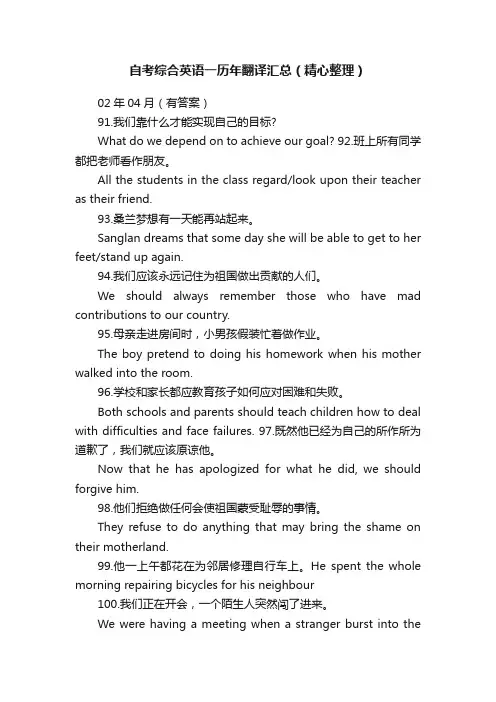
自考综合英语一历年翻译汇总(精心整理)02年04月(有答案)91.我们靠什么才能实现自己的目标?What do we depend on to achieve our goal? 92.班上所有同学都把老师看作朋友。
All the students in the class regard/look upon their teacher as their friend.93.桑兰梦想有一天能再站起来。
Sanglan dreams that some day she will be able to get to her feet/stand up again.94.我们应该永远记住为祖国做出贡献的人们。
We should always remember those who have mad contributions to our country.95.母亲走进房间时,小男孩假装忙着做作业。
The boy pretend to doing his homework when his mother walked into the room.96.学校和家长都应教育孩子如何应对困难和失败。
Both schools and parents should teach children how to deal with difficulties and face failures. 97.既然他已经为自己的所作所为道歉了,我们就应该原谅他。
Now that he has apologized for what he did, we should forgive him.98.他们拒绝做任何会使祖国蒙受耻辱的事情。
They refuse to do anything that may bring the shame on their motherland.99.他一上午都花在为邻居修理自行车上。
He spent the whole morning repairing bicycles for his neighbour100.我们正在开会,一个陌生人突然闯了进来。
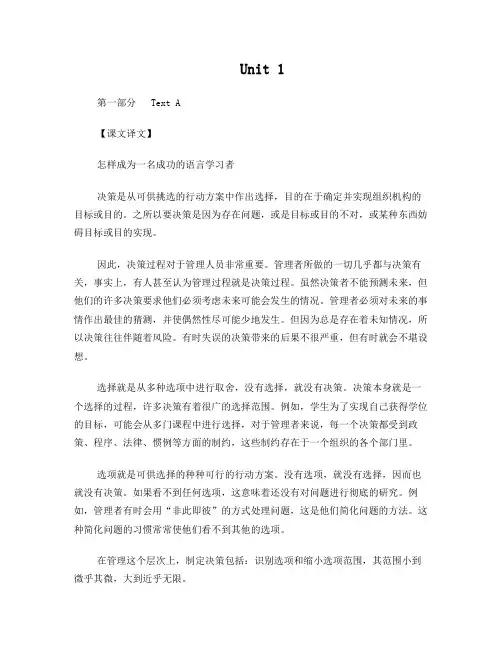
Unit 1第一部分 Text A【课文译文】怎样成为一名成功的语言学习者决策是从可供挑选的行动方案中作出选择,目的在于确定并实现组织机构的目标或目的。
之所以要决策是因为存在问题,或是目标或目的不对,或某种东西妨碍目标或目的实现。
因此,决策过程对于管理人员非常重要。
管理者所做的一切几乎都与决策有关,事实上,有人甚至认为管理过程就是决策过程。
虽然决策者不能预测未来,但他们的许多决策要求他们必须考虑未来可能会发生的情况。
管理者必须对未来的事情作出最佳的猜测,并使偶然性尽可能少地发生。
但因为总是存在着未知情况,所以决策往往伴随着风险。
有时失误的决策带来的后果不很严重,但有时就会不堪设想。
选择就是从多种选项中进行取舍,没有选择,就没有决策。
决策本身就是一个选择的过程,许多决策有着很广的选择范围。
例如,学生为了实现自己获得学位的目标,可能会从多门课程中进行选择,对于管理者来说,每一个决策都受到政策、程序、法律、惯例等方面的制约,这些制约存在于一个组织的各个部门里。
选项就是可供选择的种种可行的行动方案。
没有选项,就没有选择,因而也就没有决策。
如果看不到任何选项,这意味着还没有对问题进行彻底的研究。
例如,管理者有时会用“非此即彼”的方式处理问题,这是他们简化问题的方法。
这种简化问题的习惯常常使他们看不到其他的选项。
在管理这个层次上,制定决策包括:识别选项和缩小选项范围,其范围小到微乎其微,大到近乎无限。
决策者必须有某种方法来断定几种选项中的最佳选项,即哪个选项最有利于实现其组织的目标。
组织的目标是指该组织努力完成或达到的目标或现状。
由于个人(或组织)对于怎样实现其目标的方式都有不同的见解,最佳的选择就在于决策者了。
常常是一个组织的下属部门做出的决策对自己有利,而对上一级的部门来说,就不是较佳选择了。
这种增加部门的局部利益而减少其他部门的局部利益所作出的权衡,叫做局部优化。
例如,市场营销经理为增加广告预算可能会讲得头头是道,但从更大的布局来看,增加优化产品的研究经费也许对组织更有利。
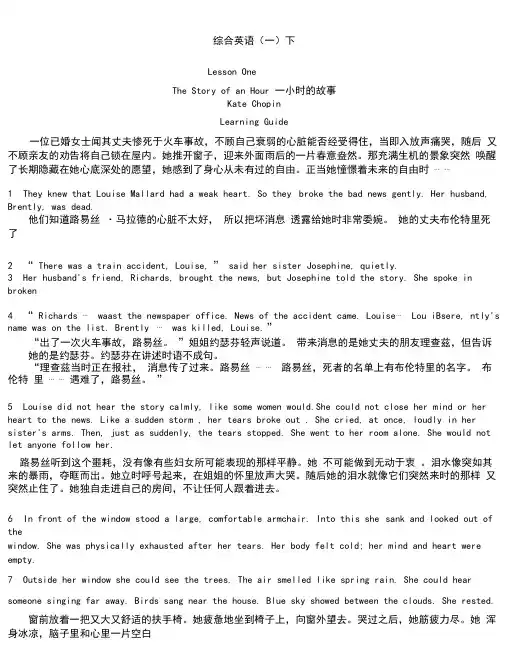
综合英语(一)下Lesson OneThe Story of an Hour 一小时的故事Kate ChopinLearning Guide一位已婚女士闻其丈夫惨死于火车事故,不顾自己衰弱的心脏能否经受得住,当即入放声痛哭,随后又不顾亲友的劝告将自己锁在屋内。
她推开窗子,迎来外面雨后的一片春意盎然。
那充满生机的景象突然唤醒了长期隐藏在她心底深处的愿望,她感到了身心从未有过的自由。
正当她憧憬着未来的自由时⋯⋯1They knew that Louise Mallard had a weak heart. So they broke the bad news gently. Her husband, Brently, was dead.他们知道路易丝·马拉德的心脏不太好,所以把坏消息透露给她时非常委婉。
她的丈夫布伦特里死了2“ There was a train accident, Louise, ” said her sister Josephine, quietly.3Her husband's friend, Richards, brought the news, but Josephine told the story. She spoke in broken4“ Richards ⋯waast the newspaper office. News of the accident came. Louise ⋯Lou iBsere, ntly's name was on the list. Brently ⋯was killed, Louise. ”“出了一次火车事故,路易丝。
”姐姐约瑟芬轻声说道。
带来消息的是她丈夫的朋友理查兹,但告诉她的是约瑟芬。
约瑟芬在讲述时语不成句。
“理查兹当时正在报社,消息传了过来。
路易丝⋯⋯路易丝,死者的名单上有布伦特里的名字。
布伦特里⋯⋯遇难了,路易丝。
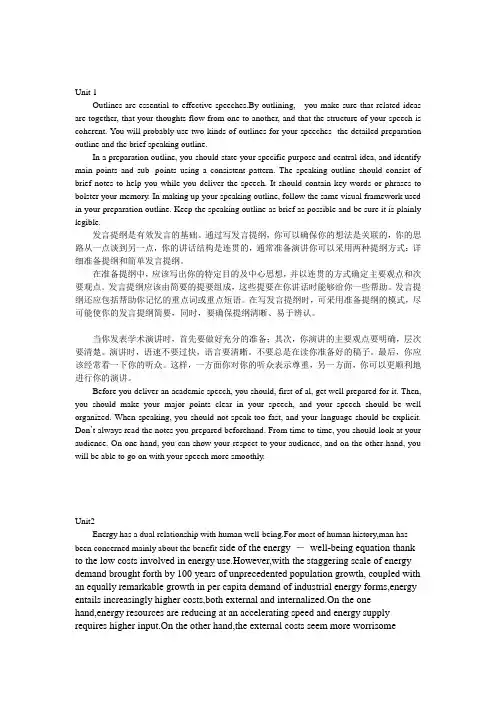
Unit 1Outlines are essential to effective speeches.By outlining, you make sure that related ideas are together, that your thoughts flow from one to another, and that the structure of your speech is coherent. You will probably use two kinds of outlines for your speeches--the detailed preparation outline and the brief speaking outline.In a preparation outline, you should state your specific purpose and central idea, and identify main points and sub--points using a consistent pattern. The speaking outline should consist of brief notes to help you while you deliver the speech. It should contain key words or phrases to bolster your memory. In making up your speaking outline, follow the same visual framework used in your preparation outline. Keep the speaking outline as brief as possible and be sure it is plainly legible.发言提纲是有效发言的基础。
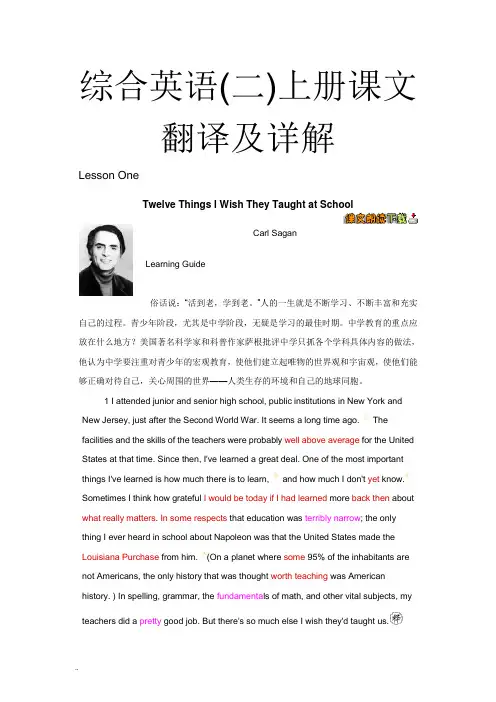
综合英语(二)上册课文翻译及详解Lesson OneTwelve Things l Wish They Taught at SchoolCarl SaganLearning Guide俗话说:“活到老,学到老。
”人的一生就是不断学习、不断丰富和充实自己的过程。
青少年阶段,尤其是中学阶段,无疑是学习的最佳时期。
中学教育的重点应放在什么地方?美国著名科学家和科普作家萨根批评中学只抓各个学科具体内容的做法,他认为中学要注重对青少年的宏观教育,使他们建立起唯物的世界观和宇宙观,使他们能够正确对待自己,关心周围的世界——人类生存的环境和自己的地球同胞。
1 I attended junior and senior high school, public institutions in New York and New Jersey, just after the Second World War. It seems a long time ago. ①The facilities and the skills of the teachers were probably well above average for the United States at that time.Since then, I've learned a great deal. One of the most important things I've learned is how much there is to learn, ②and how much I don't yet know.③Sometimes I think how grateful I would be today if I had learned more back then about what really matters. In some respects that education was terribly narrow; the only thing I ever heard in school about Napoleon was that the United States made the Louisiana Purchase from him. ④(On a planet where some 95% of the inhabitants are not Americans, the only history that was thought worth teaching was American history. ) In spelling, grammar, the fundamenta ls of math, and other vital subjects, my teachers did a pretty good job. But there's so much else I wish they'd taught us.①The facilities and skills of the teachers were probably well above average for the United States at that time.学校的设施、教师的水平在当时的美国大大高于一般的水平。
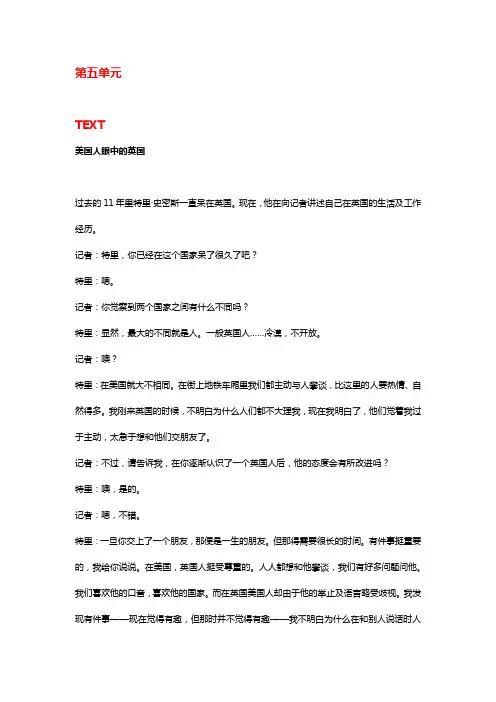
第五单元TEXT美国人眼中的英国过去的11年里特里·史密斯一直呆在英国。
现在,他在向记者讲述自己在英国的生活及工作经历。
记者:特里,你已经在这个国家呆了很久了吧?特里:嗯。
记者:你觉察到两个国家之间有什么不同吗?特里:显然,最大的不同就是人。
一般英国人……冷漠,不开放。
记者:噢?特里:在美国就大不相同。
在街上地铁车厢里我们都主动与人攀谈,比这里的人要热情、自然得多。
我刚来英国的时候,不明白为什么人们都不大理我,现在我明白了,他们觉着我过于主动,太急于想和他们交朋友了。
记者:不过,请告诉我,在你逐渐认识了一个英国人后,他的态度会有所改进吗?特里:噢,是的。
记者:嗯,不错。
特里:一旦你交上了一个朋友,那便是一生的朋友。
但那得需要很长的时间。
有件事挺重要的,我给你说说。
在美国,英国人挺受尊重的。
人人都想和他攀谈,我们有好多问题问他。
我们喜欢他的口音,喜欢他的国家。
而在英国美国人却由于他的举止及语言略受歧视。
我发现有件事——现在觉得有趣,但那时并不觉得有趣——我不明白为什么在和别人说话时人家都向后躲。
我就想了:“我身上有异味吗?我招人烦吗?”你知道,因为在美国,人们谈话时,彼此站得会靠近一些,而在英国,人们却喜欢保持一定的距离。
记者:那倒是真的。
你对在这儿的生活印象怎么样?和美国比起来呢?特里:嗯……我认为在美国生活要轻松得多。
挣钱容易花钱也容易,那儿商店总是在营业,而这里你得在五点半以前跑到超市。
总的来说,我觉得这里的生活效率较低。
假如你想找个电工,要好几天才能找到,活又干得不是很好,整个系统太陈旧了,以致于他找不到哪个地方该维修,而他也不在乎。
这也就引出非常重要的另一点:美国人工作要比英国人努力得多。
对英国人来说,个人生活重要,假日重要,花园重要,宠物重要,而美国人不会赞同这些。
对我们来说,工作是生活中最重要的。
你看这里的假期似乎比较长,人们甚至编最荒唐的借口来规避工作——“我家狗感冒了”,前几天我听到有人这么说过。
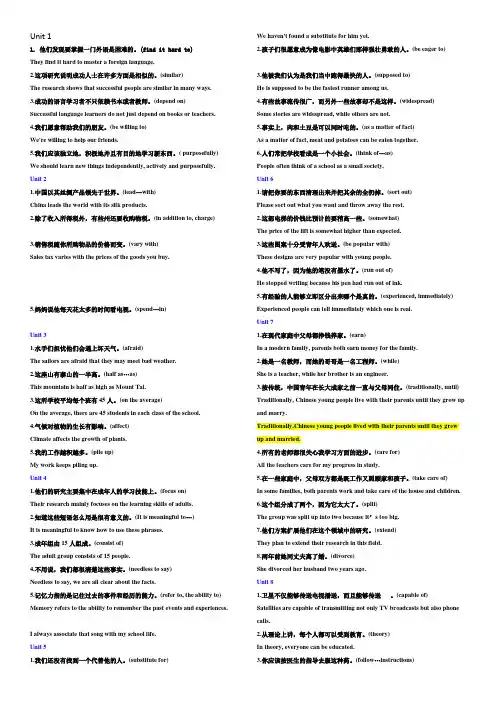
Unit 11. 他们发现要掌握一门外语是困难的。
(find it hard to)They find it hard to master a foreign language.2.这项研究说明成功人士在许多方面是相似的。
(similar)The research shows that successful people are similar in many ways.3.成功的语言学习者不只依赖书本或者教师。
(depend on)Successful language learners do not just depend on books or teachers.4.我们愿意帮助我们的朋友。
(be willing to)We're willing to help our friends.5.我们应该独立地,积极地并且有目的地学习新东西。
( purposefully) We should learn new things independently, actively and purposefully. Unit 21.中国以其丝绸产品领先于世界。
(lead…with)China leads the world with its silk products.2.除了收入所得税外,有些州还要收购物税。
(in addition to, charge)3.销售税随你所购物品的价格而变。
(vary with)Sales tax varies with the prices of the goods you buy.5.妈妈说他每天花太多的时间看电视。
(spend…in)Unit 31.水手们担忧他们会遇上坏天气。
(afraid)The sailors are afraid that they may meet bad weather.2.这座山有泰山的一半高。
(half as…as)This mountain is half as high as Mount Tai.3.这所学校平均每个班有45人。
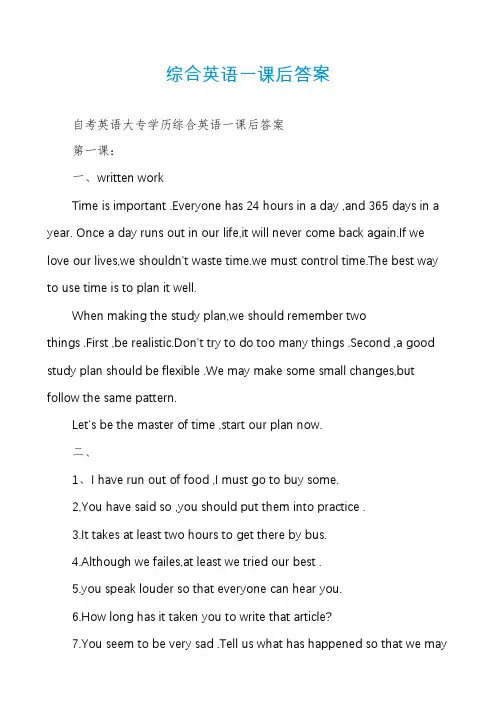
综合英语一课后答案自考英语大专学历综合英语一课后答案第一课:一、written workTime is important .Everyone has 24 hours in a day ,and 365 days in a year. Once a day runs out in our life,it will never come back again.If we love our lives,we shouldn't waste time.we must control time.The best way to use time is to plan it well.When making the study plan,we should remember twothings .First ,be realistic.Don't try to do too many things .Second ,a good study plan should be flexible .We may make some small changes,but follow the same pattern.Let's be the master of time ,start our plan now.二、1、I have run out of food ,I must go to buy some.2,You have said so ,you should put them into practice .3.It takes at least two hours to get there by bus.4.Although we failes,at least we tried our best .5.you speak louder so that everyone can hear you.6.How long has it taken you to write that article?7.You seem to be very sad .Tell us what has happened so that we mayhelp you.8.We should keep our classroom clean.9.We may asd Xiao Wang to help us ,he seems to have a lot of time.10.My brother will come to Beijing next week. he must make good use of time to stay here.三、用本课的动词句型1。
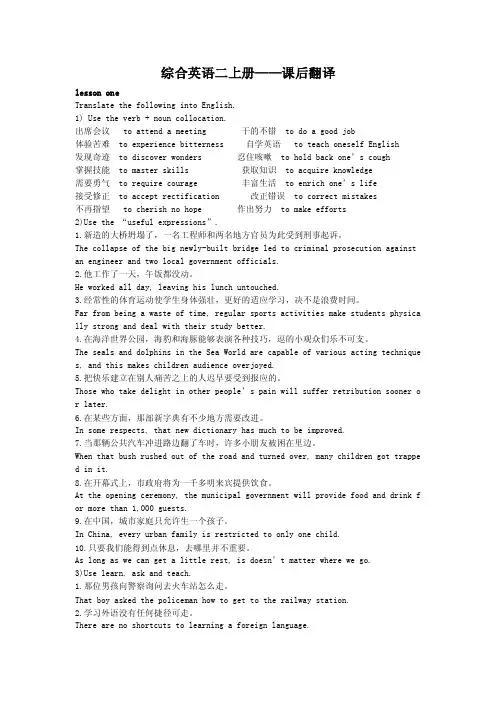
综合英语二上册——课后翻译lesson oneTranslate the following into English.1) Use the verb + noun collocation.出席会议 to attend a meeting 干的不错 to do a good job体验苦难 to experience bitterness 自学英语 to teach oneself English发现奇迹 to discover wonders 忍住咳嗽to hold back one’s cough掌握技能 to master skills 获取知识 to acquire knowledge需要勇气 to require courage 丰富生活to enrich one’s life接受修正 to accept rectification 改正错误 to correct mistakes不再指望 to cherish no hope 作出努力 to make efforts2)Use the “useful expressions”.1.新造的大桥坍塌了,一名工程师和两名地方官员为此受到刑事起诉。
The collapse of the big newly-built bridge led to criminal prosecution against an engineer and two local government officials.2.他工作了一天,午饭都没动。
He worked all day, leaving his lunch untouched.3.经常性的体育运动使学生身体强壮,更好的适应学习,决不是浪费时间。
Far from being a waste of time, regular sports activities make students physica lly strong and deal with their study better.4.在海洋世界公园,海豹和海豚能够表演各种技巧,逗的小观众们乐不可支。
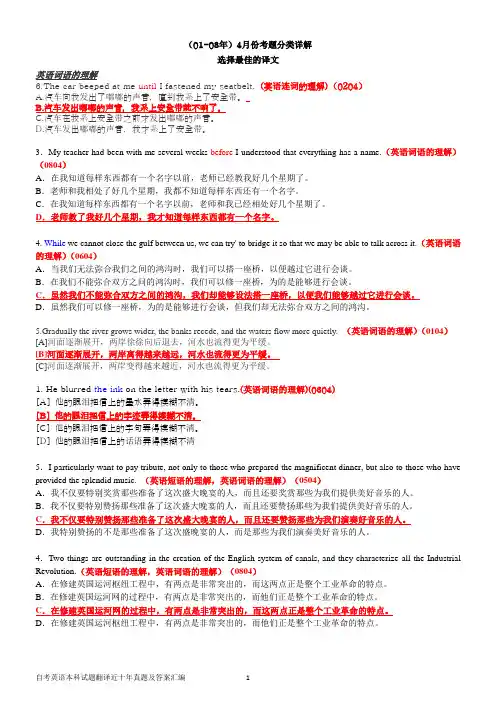
(01-08年)4月份考题分类详解选择最佳的译文英语词语的理解6.The car beeped at me until I fastened my seatbelt.(英语连词的理解)(0204)A.汽车向我发出了嘟嘟的声音,直到我系上了安全带。
B.汽车发出嘟嘟的声音,我系上安全带就不响了。
C.汽车在我系上安全带之前才发出嘟嘟的声音。
D.汽车发出嘟嘟的声音,我才系上了安全带。
3.My teacher had been with me several weeks before I understood that everything has a name.(英语词语的理解)(0804)A.在我知道每样东西都有一个名字以前,老师已经教我好几个星期了。
B.老师和我相处了好几个星期,我都不知道每样东西还有一个名字。
C.在我知道每样东西都有一个名字以前,老师和我已经相处好几个星期了。
D.老师教了我好几个星期,我才知道每样东西都有一个名字。
4. While we cannot close the gulf between us, we can try' to bridge it so that we may be able to talk across it.(英语词语的理解)(0604)A.当我们无法弥合我们之间的鸿沟时,我们可以搭一座桥,以便越过它进行会谈。
B.在我们不能弥合双方之问的鸿沟时,我们可以修一座桥,为的是能够进行会谈。
C.虽然我们不能弥合双方之间的鸿沟,我们却能够设法搭一座桥,以便我们能够越过它进行会谈。
D.虽然我们可以修一座桥,为的是能够进行会谈,但我们却无法弥合双方之间的鸿沟。
5.Gradually the river grows wider, the banks recede, and the waters flow more quietly. (英语词语的理解)(0104)[A]河面逐渐展开,两岸徐徐向后退去,河水也流得更为平缓。
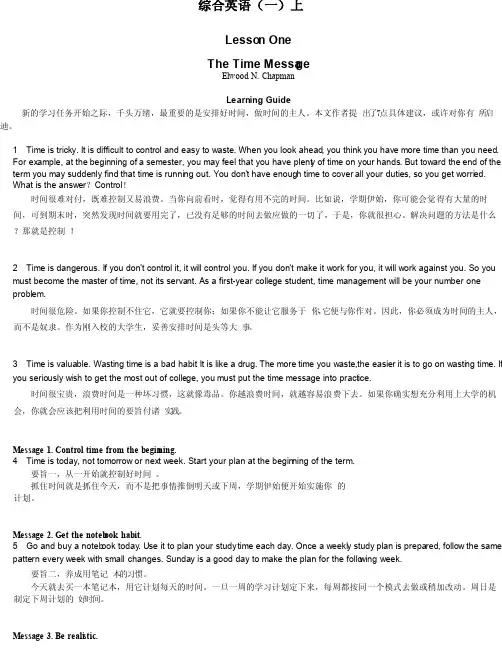
综合英语(一)上Lesson OneThe Time Messag eElwood N. Chapma nLearni ng Guide新的学习任务开始之际,千头万绪,最重要的是安排好时间,做时间的主人。
本文作者提出了7点具体建议,或许对你有所启迪。
1Time is tricky. It is diffic ult to contro l and easy to waste. When you look ahead, you thinkyou have more time than you need. For exampl e, at the beginn ing of a semest er, you may feel that you have plenty of time on your hands. But toward the end of the term you may sudden ly find that time is runnin g out. You don't have enough time to coverall your duties, so you get worrie d. What is the answer?Contro l!时间很难对付,既难控制又易浪费。
当你向前看时,觉得有用不完的时间。
比如说,学期伊始,你可能会觉得有大量的时间,可到期末时,突然发现时间就要用完了,已没有足够的时间去做应做的一切了,于是,你就很担心。
解决问题的方法是什么?那就是控制!2Time is danger ous. If you don't contro l it, it will contro l you. If you don't make it work for you, it will work agains t you. So you must become the master of time, not its servan t. As a first-year colleg e studen t, time manage mentwill be your number one proble m.时间很危险。
自考公共英语一课文翻译一Text A「课文译文」怎样成为一名成功的语言学习者“学习一门语言很容易,即使小孩也能做得到。
”大多数正在学习第二语言的成年人会不同意这种说法。
对他们来说,学习一门语言是非常困难的事情。
他们需要数百小时的学习与练习,即使这样也不能保证每个成年语言学习者都能学好。
语言学习不同于其他学习。
许多人很聪明,在自己的领域很成功,但他们发现很难学好一门语言。
相反,一些人学习语言很成功,但却发现很难在其他领域有所成就。
语言教师常常向语言学习者提出建议:“要用新的语言尽量多阅读”,“每天练习说这种语言”,“与说这种语言的人住在一起”,“不要翻译——尽量用这种新的语言去思考”,“要像孩子学语言一样去学习新语言”,“放松地去学习语言。
”然而,成功的语言学习者是怎样做的呢语言学习研究表明,成功的语言学习者在许多方面都有相似之处。
首先,成功的语言学习者独立学习。
他们不依赖书本和老师,而且能找到自己学习语言的方法。
他们不是等待老师来解释,而是自己尽力去找到语言的句式和规则。
他们寻找线索并由自己得出结论,从而做出正确的猜测。
如果猜错,他们就再猜一遍。
他们都努力从错误中学习。
成功的语言学习是一种主动的学习。
因此,成功的语言学习者不是坐等时机而是主动寻找机会来使用语言。
他们找到(说)这种语言的人进行练习,出错时请这些人纠正。
他们不失时机地进行交流,不怕重复所听到的话,也不怕说出离奇的话,他们不在乎出错,并乐于反复尝试。
当交流困难时,他们可以接受不确切或不完整的信息。
对他们来说,更重要的是学习用这种语言思考,而不是知道每个词的意思。
最后,成功的语言学习者学习目的明确。
他们想学习一门语言是因为他们对这门语言以及说这种语言的人感兴趣。
他们有必要学习这门语言去和那些人交流并向他们学习。
他们发现经常练习使用这种语言很容易,因为他们想利用这种语言来学习。
你是什么样的语言学习者如果你是一位成功的语言学习者,那么你大概一直在独立地,主动地,目的明确地学习。
自考综合英语一课后答案1、Bliss, who worked in an information centre, began to work on the book in 1 [单选题] *A. 策划B. 上班C. 写作(正确答案)D. 销售2、Can you _______ this form? [单选题] *A. fillB. fill in(正确答案)C. fill toD. fill with3、Ships can carry more goods than _____ means of transport. [单选题] *A. the otherB. anotherC. any other(正确答案)D. any4、It usually takes him about 15 minutes _______ his bike to school. [单选题] *A. ridesB. ridingC. rideD. to ride(正确答案)5、()it is to have a cold drink on a hot day! [单选题] *A. What a great funB. How great funC. What great fun(正确答案)D. How a great fun6、We got up early this morning and took a long walk after breakfast. We walked _____ the business section of the city. [单选题] *A. amongB. betweenC. through(正确答案)D. upon7、23.Susan doesn’t like cartoons. She would rather ______ Space War”. [单选题] *A.see (正确答案)B.seesC.seeingD.to see8、—Whose book is it? Is it yours?—No, ask John. Maybe it’s ______.()[单选题] *A. hersB. his(正确答案)C. he’sD. her9、The book is very _______. I’ve read it twice. [单选题] *A. interestB. interestedC. interesting(正确答案)D. interests10、—Does your grandpa live ______ in the country?—Yes. So I often go to visit him so that he won’t feel ______. ()[单选题] *A. alone; aloneB. lonely; lonelyC. lonely; aloneD. alone; lonely(正确答案)11、It' s a pity that we have to stay at home when we are having()weather. [单选题] *A. so fineB. so fine aC. such fine(正确答案)D. such a fine12、My father and I often go ______ on weekends so I can ______ very well. ()[单选题] *A. swim; swimmingB. swims; swimC. swimming; swimmingD. swimming; swim(正确答案)13、—Where did you get the book?—From my friend. I ______ it three days ago. ()[单选题] *A. lentB. borrowed(正确答案)C. keptD. returned14、41.My father is a headmaster and he is _____ charge _____ a primary school. [单选题] * A./, ofB./, withC.in, of (正确答案)D.in, with15、I will _______ from Hunan University next year. [单选题] *A. learnB. studyC. graduate(正确答案)D. come16、It’s raining heavily outside. Don’t leave _______ it stops. [单选题] *A. whileB. sinceC. until(正确答案)D. when17、_____ whether robots will one day have vision as good as human vision. [单选题] *A. What is not yet knownB. It is not yet known(正确答案)C. As is not yet knownD. This is not yet known18、He always found it hard to satisfy himself. [单选题] *A. 控制B. 满足(正确答案)C. 了解D. 批评19、———Must I return the book you lent me to you now? ——No, you( ). You can keep it for another few days. [单选题] *A.can’tB. shouldn'tC. mustn'tD. don, t have to(正确答案)20、The early Americans wanted the King to respect their rights. [单选题] *A. 统治B. 满足C. 尊重(正确答案)D. 知道21、The book is _______. You’d better buy it. [单选题] *A. useful(正确答案)B. uselessC. useD. careful22、Don’t read in bed. It’s _______ your eyes. [单选题] *A. good atB. good forC. bad atD. bad for(正确答案)23、The car _______ after forty minutes driving, so he didn’t have the interview on time. [单选题] *A. broke down(正确答案)B. broke inC. broke outD. broke up24、Can you tell me how the accident _______? [单选题] *A. came about(正确答案)B. came backC. came downD. came from25、98.There is a post office ______ the fruit shop and the hospital. [单选题] *A.atB.withC.between(正确答案)D.among26、——Can you come on Monday or Tuesday? ——Im afraid()of them is possible. [单选题] *A.neither(正确答案)B. eitherC. noneD.both27、--Can I _______ your dictionary?--Sorry, I’m using it. [单选题] *A. borrow(正确答案)B. lendC. keepD. return28、95.-Dad, can we walk? ? ? ? ? ? ?the road now?-No,we? ? ? ? ? ? ? ? ? ? . We have to wait until the light turns green. [单选题] *A.across, needn’tB.across, mustn’t(正确答案)C.though, can’tD.through, mustn't29、We are living in an age()many things are done by computer. [单选题] *A. thatB. whichC. whyD. when(正确答案)30、______ my great joy, I met an old friend I haven' t seen for years ______ my way ______ town. [单选题] *A. To, in, forB. To, on, to(正确答案)C. With, in, toD. For, in, for。
自考大学英语课文翻译及答案1 I know what courage looks like. I saw it on a flight I took 6 years ago, and only now can I speak of it without tears filling eyes at the memory.1我知道勇气是什么样子。
我在6年前的一次飞行中看到了它,只有现在,我才能说起它,而不流泪,眼睛充满了记忆。
2 When our L1011 left the Orlando Airport that Friday morning, we were a chipper, high-energy group. The early-morning flights hosted mainly professional people going to Atlanta for a day or two of business. As I looked around, I saw lots of designer suits, leather briefcases and all the trimmings of seasoned business travelers. I settled back for some light reading and the brief flight ahead.2当我们的L1011在那个星期五早上离开奥兰多机场时,我们是一个精力充沛的人。
清晨的航班主要接待专业人士到亚特兰大出差一两天。
当我环顾四周时,我看到了许多名牌西装、皮箱和所有经验丰富的商务旅行者的装饰。
我安顿下来,看了一些清淡的书和前面的短暂飞行。
3 Immediately upon taking off, it was clear that something was wrong. The aircraft was bumping up and down and jerking left toright. All the experienced travelers, including me, looked around with knowing grins. Our communal looks acknowledged to one another that we had experienced minor problems and disturbances before. If you fly much, you see these things and learn to get accustomed to them.3起飞后,很明显出了问题。
自考综合英语一课后题答案1、Jim, it’s dark now. Please _______ the light in the room. [单选题] *A. turn on(正确答案)B. turn upC. turn offD. turn down2、I’m _______ I must be leaving now. [单选题] *A. afraid(正确答案)B. thinkC. thoughtD. free3、I gave John a present but he gave me nothing_____. [单选题] *A.in advanceB.in vainC.in return(正确答案)D.in turn4、We need some green paint badly, but there' s _____ at hand. [单选题] *A. notB. nothingC. little(正确答案)D. none5、The storybook is very ______. I’m very ______ in reading it. ()[单选题] *A. interesting; interested(正确答案)B. interested; interestingC. interested; interestedD. interesting; interesting6、We need two ______ and two bags of ______ for the banana milk shake.()[单选题]*A. banana; yogurtB. banana; yogurtsC. bananas; yogurt(正确答案)D. bananas; yogurts7、The manager was quite satisfied with his job. [单选题] *A. 担心的B. 满意的(正确答案)C. 高兴的D. 放心的8、Jim wants to hang out with his friends at night, but his parents don’t allow him ______ so. ()[单选题] *A. doB. doneC. to do(正确答案)D. doing9、Jim, we have _______ important to tell you right now . [单选题] *A. someB. something(正确答案)C. anyD. anything10、Julia’s on holiday in Shanghai _______. [单选题] *A. in a momentB. after a momentC. at the moment(正确答案)D. at any moment11、She and her family bicycle to work, _________ helps them keep fit. [单选题] *A. which(正确答案)B. whoC.itD. that12、Mrs. Black is on her way to England. She will _______ in London on Sunday afternoon. [单选题] *A. reachB. attendC. arrive(正确答案)D. get13、It seems slow for children to become _____ ,while adults often feel time flies. [单选题] *A. growns-upsB. growns-upC. grown upsD. grown-ups(正确答案)14、I’d like to go with you, ______ I’m too busy. [单选题] *A. orB. andC. soD. but(正确答案)15、You needn’t _______ me. I’m old enough to take care of myself. [单选题] *A. worry about(正确答案)B. write downC. put awayD. wake up16、—It’s too noisy outside. I can’t fall asleep.—I can’t, either. We have to ______ new ways to solve the problem.()[单选题] *A. come up with(正确答案)B. get on withC. make up withD. catch up with17、What about _______ there by bike? [单选题] *A. goesB. wentC. goD. going(正确答案)18、62.--There is? ? ? ? ? sale on in the shop today. Let’s go together.--Please wait? ? ? ? ? ?minute. I’ll finish my homework first. [单选题] *A.a; theB.a; a(正确答案)C.the; aD.the; the19、If you get _______, you can have some bread on the table. [单选题] *A. happyB. hungry(正确答案)C. worriedD. sad20、Mr. Wang is coming to our school. I can’t wait to see _______. [单选题] *A. herB. him(正确答案)C. itD. them21、Bob is young, _______ he knows a lot. [单选题] *A. becauseB. soC. but(正确答案)D. unless22、_____ Lucy _____ Lily has joined the swimming club because they have no time. [单选题] *A. Not only; but alsoB. Neither; nor(正确答案)C. Either; orD. Both; and23、Be careful when you _______ the street. [单选题] *A. are crossingB. is crossingC. cross(正确答案)D. is cross24、( ) What other books have you read___ this English novel? [单选题] *A. besides(正确答案)B. exceptC.inD. about25、This kind of work _______ skills and speed. [单选题] *A. looks forB. waits forC. calls for(正确答案)D. cares for26、Actually, we don't know whether this news comes from a reliable()or not. [单选题] *A. source(正确答案)B. originC. basisD. base27、These two films are very interesting. I like them _____. [单选题] *A. eitherB. neitherC. allD. both(正确答案)28、The book is _______. You’d better buy it. [单选题] *A. useful(正确答案)B. uselessC. useD. careful29、38.—Do you have ________else to say for your mistake?—________but sorry. [单选题] * A.anything; SomethingB.something; EverythingC.anything; Nothing(正确答案)D.something; Anything30、Tom’s sister is a nurse. I met _______ in the street yesterday . [单选题] *A. sheB. hersC. himD. her(正确答案)。
全国自考《综合英语(一)》历年真题及详解【圣才出品】2015年10月全国自考《综合英语(一)》真题及详解课程代码:00794选择题部分I.语法和词汇填空。
阅读下面的句子,从A、B、C和D四个选项中选出一个能填入空白处的最佳选项,并在答题纸上将该项的字母涂黑。
(本大题共20小题,每小题1分,共20)1.Down about two hundred yards_____three logs right across the stream.A.isB.areC.haveD.has【答案】B【解析】句意:沿着溪流对面向下二百码的地方,有三根木头。
方位副词down位于句首,句子全部倒装,谓语动词与主语three logs保持一致,用复数形式。
B项符合题意,故选B项。
2.She has always enjoyed reading newspapers,magazines and books,all of_____have been of great help to her in television reporting.A.thatB.themC.thoseD.which【答案】D【解析】句意:她一直都很喜欢阅读报纸、杂志和书籍,这些对她在电视上的报道有很大的帮助。
两个句子都有谓语动词,且用逗号隔开,故为非限定性定语从句,只能用关系代词which引导。
D项符合题意,故选D 项。
3.The reason_____his being late was that the flight he took had been delayed.A.ofB.inC.forD.with【答案】C【解析】句意:他迟到的原因是航班延误了。
the reason for为固定搭配,表示“……的原因”。
C项符合题意,故选C项。
4.Keep trying,and you’ll figure it out.You know_____they say:if at first you don’t succeed,try,try again.A.whyB.whatC.howD.that【答案】B【解析】句意:继续努力,你会弄明白的。
Lesson Five Are you Giving Y our Kids T oo Much?1 While traveling for various speaking engagements, I frequently stay overnight in the home of a family and am assigned to one of the children's bedrooms. In it, I often find so many playthings that there's almost no room - for my small toilet kit. And the closet is usually so tightly packed with clothes that I can barely squeeze in my jacket.2 I'm not complaining, only making a point. I think that the tendency to give children an overabundance of toys and clothes is quite common in American families, and I think that in far too many families not only do children come to take their parents' generosity for granted, but also the effects of this can actually be somewhat harmful to children.3 Of course, I'm not only thinking of the material possessions children are given. Children can also be overindulged with too many privileges - for example, when parents send a child to an expensive summer camp that the parents can't really afford.4 Why parents give their children too much, or give things they can't afford? I believe there are several reasons.5 One fairly common reason is that parents overindulge their children out of a sense of guilt. Parents who both hold down full-time jobs may feel guilty about the amount of time they spend away from their children[0804:64] and may attempt to compensate by showering them with material possessions.6 Other parents overindulge because they want their children to have everything they had while growing up, along with those things the parents yearned for but didn't get. Still others are afraid to say no to their children's endless requests for toys for fear that their children will feel unloved or will be ridiculed if they don't have the same playthings their friends have.7 Overindulgence of a child also happens when parents are unable to stand up to their children's unreasonable demands.[0907:61; 1001:61] Such parents vacillate between saying no and giving in - but neither response seems satisfactory to them. If they refuse a request, they immediately feel a wave of remorse for having been so strict or ungenerous. If they give in, they feel regret and resentment over having been a pushover.[0610:44] This kind of vacillation not only impairs the parents' ability to set limits, it also sours the parent-child relationship to some degree, robbing parents and their children of some of the happiness and mutual respect that should be present in healthy families.8 But overindulging children with material things does little to lessen parental guilt [0907:32] (since parents never feel that they've given enough), nor does it make children feel more loved (for what children really crave is parents’ time and attention). Instead, the effects of overindulgence can be harmful. Children may, to some degree, become greedy, self-centered, ungrateful and insensitive to the needs and feelings of others, beginning with their parents. When children are given too much, it undermines their respect for their parents. In fact, the children begin to sense that a parent's unlimited generosity is not right. The paradoxical result may be that these children will push further, unconsciously hoping that, if they push too hard, they will force their parents into setting limits.9 Also, overindulged children are not as challenged as children with fewer playthings to be more creative in their play. [0607:50] They have fewer opportunities to learn the value of money, and have less experience in learning to deal with a delay in gratification, if every requested object is given on demand.10 The real purpose of this discussion is not to tell parents how much or how little to give to their children. Rather, my intent is to help those parents who have already sensed that they might be overindulging their children but don't know how to stop.11 Parents who are fortunate enough not to have a problem with feelings of guilt don't need to respond crossly to their children when denying a specific request which is thought to be unreasonable. They can explain, cheerfully, that it's too expensive - except perhaps as a birthday or holiday gift - or that the child will have to contribute to its purchase from an allowance or from the earnings of an outside job. [0310:43]12 It's the cheerfulness and lack of hesitation that impress upon the child that parents mean what they say. A cross response signals that the parents are in inner conflict.[0410:42] In fact, I'll make a rash statement that I believe is true, by and large: Children will abide by what their parents sincerely believe is right. They only begin arguing and pestering when they detect uncertainty or guilt, and sense that their parents can be pushed to give them what they want, if they just keep at it. But the truth is that a child really wants parents to be in control - even if it means saying no to a request - and to act with conviction in a kind and loving fashion.13 But, you may answer, I often am uncertain about whether to give in to many of my children's requests. That doesn't mean you can't change. First you should try to determine what makes you submissive or guilty. Then, even if you haven't uncovered the reason, you should begin to make firm decisions and practice responding to your children's requests in a prompt, definite manner.14 Once you turn over a new leaf, you can't expect to change completely right away. [1107:34] Y ou are bound to vacillate at times. [0607:43] The key is to be satisfied with gradual improvement, expecting and accepting the occasional slips that come with any change. And even after you are handling these decisions in a firmer and more confident manner, you can't expect your children to respond immediately. For a while they'll keep on applying the old pressures that used to work so well. But they'll eventually come to respect your decisions once they learn that nagging and arguing no longer work. In the end, both you and your children will be happier for it.第五课你给孩子的东西是不是太多?1 当我应邀到各地演说时,常常在别人家过夜,而且往往被安排住在这家孩子的卧室里。